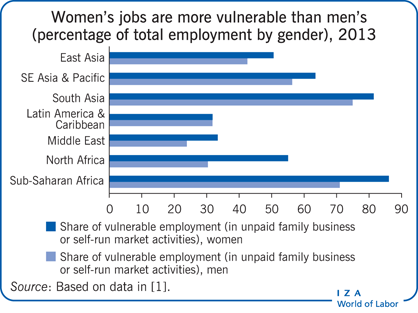Elevator pitch
Engaging in paid work is generally difficult for women in developing countries. Many women work unpaid in family businesses or on farms, are engaged in low-income self-employment activities, or work in low-paid wage employment. In some countries, vocational training or grants for starting a business have been effective policy tools for supporting women’s paid work. Mostly lacking, however, are job and business training programs that take into account how mothers’ employment affects child welfare. Access to free or subsidized public childcare can increase women’s labor force participation and improve children’s well-being.
Key findings
Pros
Job training and wage subsidies encourage female paid employment in the formal sector.
Business training increases female labor force participation and raises the income of low-earning women already in business.
In low-income households, access to free or subsidized public childcare increases women’s labor force participation.
Child health and nutrition may improve with female paid employment if the money spent on children rises.
Female paid employment improves child schooling.
Cons
The positive effects of training and wage subsidies tend to disappear after one or two years.
Business training increases profitability only in the short term and is only effective in starting subsistence businesses.
The effects of childcare programs on female labor supply are not clear.
When women work, children’s well-being can decline, since mothers have less time for childcare.
Women in poorer households are more likely to work, but their labor income is not enough to increase school attendance of children.
